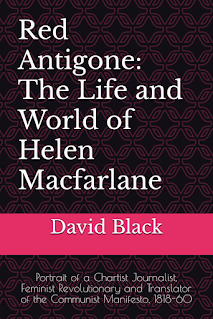Red Antigone: The Life and World of Helen Macfarlane, by David Black (BPC Publishers, 2024)
On a spring day in 1860, parishioners at the tiny fourteenth-century church at Baddiley, deep in the heart of the Cheshire countryside, gathered for the funeral of the vicar’s wife. Helen Edwards had died after a short illness aged just 41, and was laid to rest in the churchyard at St Michael’s in a peaceful spot in the shade of a large and now quite ancient tree.
John Wilkinson Edwards already had seven surviving children from his first marriage when the couple met in 1855, and together he and Helen would have two more. It is not hard to picture a cosy life for them in the rectory before Helen’s early and probably unexpected death: the vicar writing his Sunday sermon for however many of his 280 parishioners could be expected to make their way in from the surrounding farms, while Mrs Edwards attended to her large and growing family and offered words of encouragement to her husband.Parishioners might, however, have been startled by the life that Helen Edwards had left behind when she came to Baddiley. Born into a comfortable Scottish middle class family in 1818, the young Helen Macfarlane moved to London following the death of her father George in 1842 and the subsequent failure of his calico print business. She found work as a governess, and in 1848 witnessed the revolutions that swept Europe firsthand while in Vienna, where the government was overthrown before a violent and bloody backlash restored the old regime. On her return to England, Macfarlane would become an important figure in the emerging socialist milieu surrounding the Chartist George Julian Harney and Europe’s revolutionary exiles, including Karl Marx and Friedrich Engels. Macfarlane became an important contributor to Harney’s Red Republican and Friend of the People, and her work was much admired by Marx and others. Indeed, she is best remembered today as the first translator of the Communist Manifesto. Her involvement, however, lasted less than a year - from January to December 1850.
In Red Antigone, David Black tells the story of this remarkable woman and her political journey. The author has been engaged in uncovering her life and work for many years, publishing an earlier book focusing on her published writing some twenty years ago and working with the journalist Louise Yeoman on a now sadly unavailable programme for BBC Radio Scotland in 2012. There is no doubt that Black has done great work in rescuing an important yet much overlooked and, until recently, largely forgotten Chartist thinker and writer from the swirling mists of history - someone he regards with good reason as the ‘shooting star’ of late Chartist journalism.
But I must admit that I cannot help but feel a bit disappointed by this book. Red Antigone is a very brief work – a hundred pages of large type amounting to probably no more than 30,000 words. It has a fair bit to say about Macfarlane’s Scottish ancestry among the minor Scottish lairds turned business owners and her father and brothers’ likely politics, and even more on the nexus of Chartist and expat politics in London, where Marx and Engels were busy honing their Statler and Waldorf act, exchanging cantankerous comments and barbed judgements on all those with whom they disagreed (which was pretty much everyone except Macfarlane, who Marx thought a ‘rara avis’ or rare bird). But it offers few tangible facts about Macfarlane herself that have not been in the public domain for some time (see Wikipedia and Chartist Ancestors).
This is hardly the author’s fault. It was, after all, thanks to his efforts that what we do know of Macfarlane’s life has come to be rediscovered. And she has always been, possibly deliberately, rather elusive in the public record: there is no apparent entry in the civil register for her first marriage (if indeed it took place at all) to Francis Proust or for the birth of their daughter Consuela Proust, both of whom died during an abortive attempt by the family to emigrate to Natal. It is also fair to say that David Black has done a great deal in this book to get to grips with Macfarlane’s political and religious ideas, and how she might have managed the seemingly impossible task of squaring her revolutionary ideals and proto-libertarian theology with life as a Church of England vicar’s wife.
Yet it leaves me wanting more. Alongside this book, David Black is publishing a second volume of Macfarlane’s complete writings titled Red Chartist. And I cannot help thinking that it would have been more satisfying to have pulled all this together in one book which gave a plain account of her life, moved on to discuss the meaning and importance of her ideas, then led into her own work. Regardless, if you are not aware of Helen Macfarlane’s life, you should spare a little time to read her story.
Red Antigone: The Life and World of Helen Macfarlane and Red Chartist: Helen Macfarlane 1818-60 The Complete Annotated Writings and her Translation Karl Marx's Communist Manifesto are available only through Amazon.

No comments:
Post a Comment
Note: only a member of this blog may post a comment.